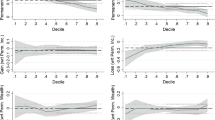Abstract
The available empirical evidence continues to suggest that people commonly value losses more, and often much more, than otherwise commensurate gains. Consequently, current practice of using the WTP measure for all changes is often likely to lead to misleading assessments of welfare changes. The reference dependence of preferences implies instead that while the WTP measure is appropriate for gains, the value of both positive and negative changes in the domain of losses will usually be more accurately assessed with the WTA measure.
Similar content being viewed by others
References
Bromley D (1995) Property rights and natural resource damage assessments. Ecol Econ 14: 129–135
Cohen D, Knetsch JL (1992) Judicial choice and disparities between measures of economic values. Osgoode Hall Law J 30: 737–770
Cropper ML, Aydede SK, Portney PR (1994) Preferences for life saving programs: how the public discounts time and age. J Risk Uncertain 8: 243–265
Einio M, Kaustia M, Puttonen V (2008) Price setting and the reluctance to realize losses in apartment markets. Econ Psychol 29: 19–34
Ellickson R (1973) Alternatives to zoning: covenants, nuisance rules, and fines as land use controls. Univ Chic Law Rev 40: 581–781
Fischel W (1995) Regulatory takings: law, economics and politics. Harvard University Press, Cambridge
Frey B, Pommerehne WW (1987) International trade in art: attitudes and behaviour. Rivista Internazionale de Scienze Economiche a Commerciali 34: 465–486
Friedman LS (2002) The microeconomics of public policy analysis. Princeton University Press, Princeton
Genesove D, Mayer C (2001) Loss aversion and seller behavior: evidence from the housing market. Q J Econ 116: 1233–1260
Hammack J, Brown GM (1974) Waterfowl and wetlands: toward bio-economic analysis. Johns Hopkins Press, Baltimore
Harless DW (1989) More laboratory evidence on the disparity between willingness to pay and compensation demanded. J Econ Behav Organ 11: 359–379
Henderson AM (1941) Consumer’s surplus and the compensation variation. Rev Econ Stud 8: 117
Horowitz J, McConnell K (2002) A review of WTA/WTP studies. J Environ Econ Manage 44: 426–447
Johnson EJ, Hershey J, Meszaros J, Kunreuther H (1993) Framing probability distortions and insurance decisions. J Risk Uncertain 7: 35–51
Kachelmeier SJ, Shehata M (1992) Estimating risk preferences under high monetary incentives: experimental evidence from the people’s republic of china. Am Econ Rev 82: 1120–1140
Kahneman D, Knetsch JL, Thaler RH (1990) Experimental tests of the endowment effect and the coase theorem. J Polit Econ 98: 728–741
Kahneman D, Miller D (1986) Norm theory: comparing reality to its alternatives. Psychol Rev 93: 136–153
Knetsch JL, Sinden JA (1984) Willingness to pay and compensation demanded: experimental evidence of an unexpected disparity in measures of value. Q J Econ 99: 507–521
Knetsch JL, Tang F-F, Thaler RH (2001) The endowment effect and repeated market trials: is the vickrey auction demand revealing. Exp Econ 4: 257–269
Knetsch JL, Wong W-K (2009) The endowment effect and the reference state: evidence and manipulations. J Econ Behav Organ 71: 407–413
Koszegi B, Rabin M (2006) A model of reference-dependent preferences. Q J Econ 121: 1133–1165
Laffont JJ (1987) Revelation of preferences. In: Eatwell J, Milgate M, Newman P (eds) The new palgrave: a dictionary of economics. Macmillan Press, London, pp 170–171
List JA (2003) Does market experience eliminate market anomalies. Q J Econ 118: 47–71
Novemsky N, Kahneman D (2005) The boundaries of loss aversion. J Mark Res 42: 119–128
Odean T (1998) Are investors reluctant to realize their losses. J Finance 53: 1775–1798
Plott CR, Zeiler K (2005) The willingness to pay—willingness to accept gap, the ‘ endowment effect,’ subject misconceptions, and experimental procedures for eliciting valuations. Am Econ Rev 95: 530–545
Plott C, Zeiler K (2007) Asymmetries in exchange behaviour incorrectly interpreted as evidence of prospect theory. Am Econ Rev 97: 1449–1466
Putler DS (1992) Incorporating reference price effects into a theory of consumer choice. Mark Sci 11: 287–309
Rabin M (1998) Psychology and economics. J Econ Lit 36: 11–46
Shefrin H, Stateman M (1985) The disposition to sell winners too early and ride losers too long: theory and evidence. J Finance 44: 777–790
Shogren JF, Shin SY, Hayes DJ, Kliebenstein JB (1994) Resolving differences in willingness to pay and willingness to accept. Am Econ Rev 84: 225–270
Sunstein CR (1993) Endogenous preferences, environmental law. J Legal Stud 22: 217–254
Thaler RH, Benartzi S (2004) Save more tomorrow: using behavioral economics to increase employee saving. J Polit Econ 112: S164–S182
US Environmental Protection Agency: (2000) Guidelines for preparing economic analyses. Environmental Protection Agaency, Washington
Viscusi WK, Magat WA, Huber J (1987) An investigation of the rationality of consumer valuations of multiple health risks. Rand J Econ 18: 465–479
Zerbe R (2001) Economic efficiency in law and economics. Edward Elgar Press, Cheltenham
Author information
Authors and Affiliations
Corresponding author
Rights and permissions
About this article
Cite this article
Knetsch, J.L. Values of Gains and Losses: Reference States and Choice of Measure. Environ Resource Econ 46, 179–188 (2010). https://doi.org/10.1007/s10640-010-9355-8
Accepted:
Published:
Issue Date:
DOI: https://doi.org/10.1007/s10640-010-9355-8




